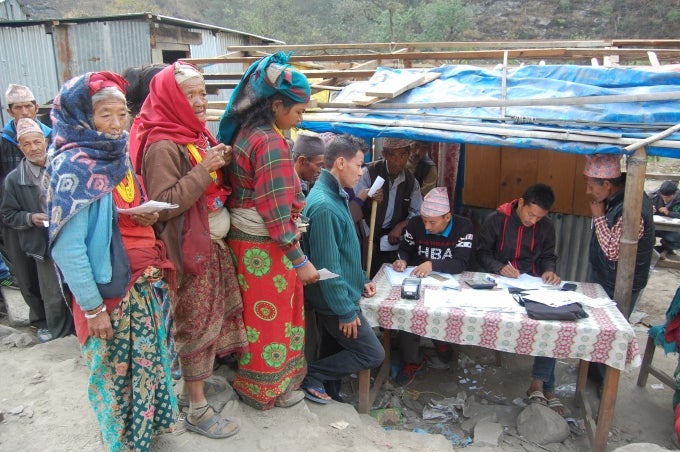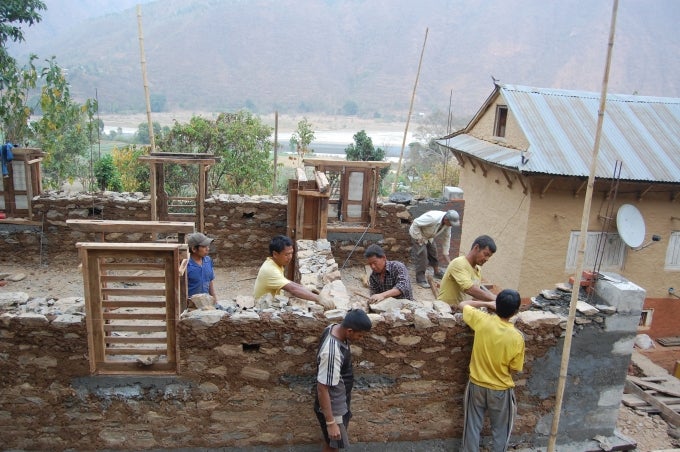
The rebuilding has long begun in Nuwakot District in the foothills of the Himalayas in Nepal.
Twenty months after the earthquake that took lives and devastated livelihoods, people are receiving their first payments under a housing reconstruction project and are rebuilding their homes to higher standards. This will hopefully make them safer when the next earthquake hits.
The villagers I met were pleased to be getting financial and technical support to rebuild their lives but their frustration over the slow start still lingered. This is understandable given the suffering the earthquake caused and the slowdown in recovery efforts that came soon afterwards because of the disruption at Nepal’s border. But signs of enthusiasm dominated as stonemasons, engineer trainees and local officials mobilize in the rebuilding effort.
The pace of recovery needs to be put into context. The progress achieved in Nepal is in line with other similar experiences in countries such as Pakistan and Indonesia. The key now will be in pushing ahead with delivery of what the government and its development partners have promised the Nepali people.
The progress so far is encouraging. As of the end of November, more than 430,000 households have received the first of three payments to rebuild their homes under the government’s housing reconstruction program.
The program, supported by the World Bank and other development partners -- including the Global Facility for Disaster Reduction and Recovery (GFDRR) --, combines enforcing higher building standards with making sure the money is spent well. Each grant payment is subject to certification by competent technical personnel in order to ensure that houses are rebuilt to safer standards. The grants are deposited directly into the bank accounts of the beneficiaries. Every check issued can be tracked by the government’s budget management system and reported for third-party verification.

Nepal’s National Reconstruction Authority is doing a good job under challenging circumstances. Its future success will benefit from institutional stability and continued strong support from the government.
Beyond earthquake reconstruction, Nepal has many major challenges in overcoming poverty, which is still too high in the country.
The World Bank Group is helping Nepal to spread prosperity across the country and plans to substantially increase the money available for Nepal in the three years from 2017. The additional resources can be used to help smoothen Nepal’s transition to federalism, manage vulnerabilities such as potential global economic downturns and declines in remittances from overseas workers, as well as to mitigate climate and disaster risks.
As with the earthquake reconstruction, delivery will be critical to make sure the Nepalese people benefit from these bigger resources.
We will work with the government to improve implementation in projects. This will mean addressing issues around financial management, procurement, contract management, and project staffing. We stand ready to work with Nepal on improving its public investment management system, particularly in relation to the upcoming devolution of decisions and resources in the future federal set-up.
Things are looking up for Nepal. We expect economic growth to rebound to five percent in fiscal year 2016-17 from around three percent. The country will do even better if it can rely less on consumption paid for from remittances and instead rely on economic growth powered by investment. If it can make this change then the economy in Nepal will create more jobs, particularly for youth who currently often have to go abroad for work.
Investment-led growth promotes social inclusion and can help to make economic growth more sustainable over the long run. Economic growth more generally can support Nepal’s planned state restructuring and ensure the transition remains peaceful.
Economic growth will require policy reforms, an improved business environment, upgrading infrastructure – especially transport and energy – improving domestic resource management and strengthening the financial sector. We are ready to work with Nepal in these areas that promise to bring more prosperity to all its people.
This blog was originally published on The Himalayan Times on 21 December 2016


Join the Conversation